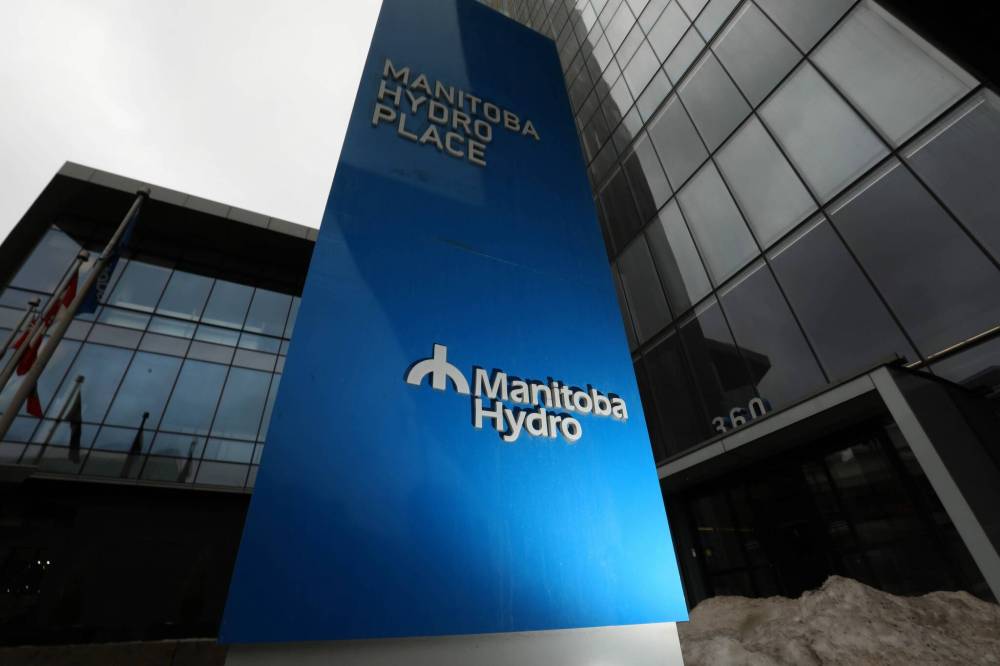Hydro’s paying of union leaders questioned
Advertisement
Read this article for free:
or
Already have an account? Log in here »
We need your support!
Local journalism needs your support!
As we navigate through unprecedented times, our journalists are working harder than ever to bring you the latest local updates to keep you safe and informed.
Now, more than ever, we need your support.
Starting at $15.99 plus taxes every four weeks you can access your Brandon Sun online and full access to all content as it appears on our website.
Subscribe Nowor call circulation directly at (204) 727-0527.
Your pledge helps to ensure we provide the news that matters most to your community!
Read unlimited articles for free today:
or
Already have an account? Log in here »
WINNIPEG — Manitoba Hydro continues to pay the salaries and benefits of union leaders despite its bleak financial picture as well as the ballooning provincial government deficit.
Ratepayers are on the hook for 80 per cent of CUPE 998 president Michelle Bergen’s $94,813 annual salary, plus benefits, Dale Edmunds, national communications specialist for CUPE, confirmed Tuesday. The remaining 20 per cent is paid by union dues.
“An amicable kind of resolve has been reached here that sees each party contribute to the wages and a rough proportion to the duties that are done,” Edmunds said.

Manitoba Hydro continues to pay the salaries and benefits of union leaders despite its bleak financial picture as well as the ballooning provincial government deficit. (Ruth Bonneville/Winnipeg Free Press files)
“I think there’s a lot of economic value and monetary value that comes with having a booked-off president from the workplace.”
Hydro spokesperson Peter Chura declined to say whether the agreement might be scrapped, citing ongoing bargaining between CUPE and Hydro. The local 998 collective agreement expired in December.
A spokesperson for Adrien Sala, minister responsible for Hydro, declined to comment in light of negotiations.
The Winnipeg Free Press reported in 2020 that the salary compensation agreement had been in place for more than 20 years. Questions about whether the arrangement was appropriate were raised at a time when Manitoba Hydro was deep in debt from major projects and had repeatedly sought consumer rate hikes above the rate of inflation.
The CUPE president, who represents 900 clerical and technical workers at the Crown corporation, does not perform work as a Manitoba Hydro employee, as per a letter of understanding between Hydro and the union.
The 2022 letter explains employees who have been granted leave from their normal duties are to act as full-time president for the union local.
Manitoba Hydro is responsible for applying the terms of the letters of understanding with the unions.
Jayson Devaney, president of Unifor Local 681, which represents 300 gas workers and 100 meter readers, also has 50 per cent of his salary paid by the corporation, but he is expected to spend half his time fulfilling his union responsibilities and half his time focused on his duties at Manitoba Hydro.
Bergen is currently on vacation and was unavailable to comment Tuesday. Devaney could not be reached for comment.
Hydro continues to pay the salaries as it battles its own financial troubles, including a shortage of funds to maintain and upgrade aging infrastructure.
The Manitoba government, as part of its 2025-26 budget, promised a one-year freeze on Hydro rates, but is expected to shoulder a $70-million loss in provincial revenue, largely due to Hydro’s drought-related losses.
In addition, the government has forecast a deficit of at least $794 million this fiscal year, which could double depending on the severity of tariffs imposed by the U.S. on Canadian goods.
University of Winnipeg Prof. Malcolm Bird, who studies Crown corporations, said while the agreement may have been an informal deal between various stakeholders to ensure they had resources to fund their operations, the practice should end.
Other provinces may have had similar arrangements in the past, but as contracts were modernized the practice ended and unions took the financial reins of its representatives — except in Manitoba, Bird said.
“In today’s light, they look peculiar, and they probably should be ended,” he said. “The Crown should not be paying directly to support the union positions.”
Gage Haubrich, Prairie director of the Canadian Taxpayers Federation, called the practice a conflict of interest, questioning why Hydro would directly pay the person it negotiates with during collective bargaining.
“People should be paid for by who they’re working for, and the union president is working for union members, not Hydro,” Haubrich said.
Troy Craig, assistant business manager of the International Brotherhood of Electrical Workers Local 2034, which represents about 2,300 workers who generate and distribute power and maintain power lines, confirmed Hydro doesn’t pay the salary of its local president, Ryan Stewart. The union receives an annual $110,000 subsidy from the employer for “education purposes,” Craig said.
Corey Eyolfson, president of the Association of Manitoba Hydro Staff and Supervisory Employees, declined to tell the Free Press whether any part of his salary is paid by the Crown corporation.
In 2018, controversy unfolded when documents showed the City of Winnipeg paid 60 per cent of the salary of the United Fire Fighters of Winnipeg president, Alex Forrest. In 2020 then-mayor Brian Bowman vowed to scrap the agreement.
On Tuesday, Colin Fast, a spokesperson for Mayor Scott Gillingham, confirmed the union pays 100 per cent of salary-related union activities.
» Winnipeg Free Press
